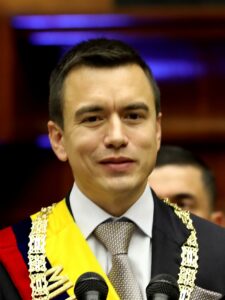Politics
Ecuador Politics
Dive into the heart of Ecuador’s political landscape on this page, where real-time RSS feed news and videos bring you closer to the action. With the dynamic power of RSS feeds at your fingertips, you’ll be effortlessly informed about the freshest developments in Ecuador’s political arena. Experience the pulse of political events, policy transformations, and key milestones through up-to-the-minute updates, ensuring you’re always in the loop with the constantly changing political scene.

Daniel Noboa Azin
48th President of Ecuador
Incumbent
Assumed office
23 November 2023
Image credit
Ecuador is a democratic republic with three branches of government: Executive, Legislative, and Judicial. The President, elected for a four-year term with possible re-election, serves as both head of state and government, and appoints the Council of Ministers. The Vice President, elected alongside the President, shares the executive responsibilities. The President’s leadership is crucial for the implementation of national policies, international relations, and overall governance, ensuring the executive branch operates efficiently and effectively.
The National Assembly, Ecuador’s unicameral legislature, comprises 137 members elected for four years. It creates laws, manages fiscal policy, and oversees government operations, including initiating impeachment proceedings when necessary. This legislative body plays a vital role in representing the diverse interests of Ecuadorians, debating and passing legislation that impacts every aspect of life in the country. The National Assembly also has the responsibility to approve the national budget, ensuring the allocation of resources aligns with the country’s priorities and needs.
The judiciary is independent and led by the National Court of Justice with 21 judges serving nine-year terms. It includes provincial and cantonal courts, as well as judges for rural and urban areas. The Constitutional Court ensures laws adhere to the Constitution, maintaining the integrity of Ecuador’s legal framework based on civil law. This independence is crucial for upholding the rule of law and protecting citizens’ rights, providing a check on the other branches of government and ensuring justice is administered fairly across the nation. The judiciary’s role extends to interpreting the Constitution, resolving legal disputes, and safeguarding democratic principles.
Ecuador’s political structure promotes a balance of power among the three branches of government, fostering a system of checks and balances. This structure is designed to prevent the concentration of power and encourage cooperation among branches. Regular elections and the ability to impeach officials ensure accountability and responsiveness to the people’s will. Additionally, civil society and media play essential roles in monitoring government actions, promoting transparency, and advocating for reforms when necessary.
Unless other sources are listed, original content is provided by ChatGPT. ChatGPT may produce inaccurate information about people, places, or facts. #Ecuador #EcuadorPolitics #EcuadorNews #EcuadorNewsToday #EcuadorRSSFeed #BlahFace #DanielNoboa #EcuadorPresident




